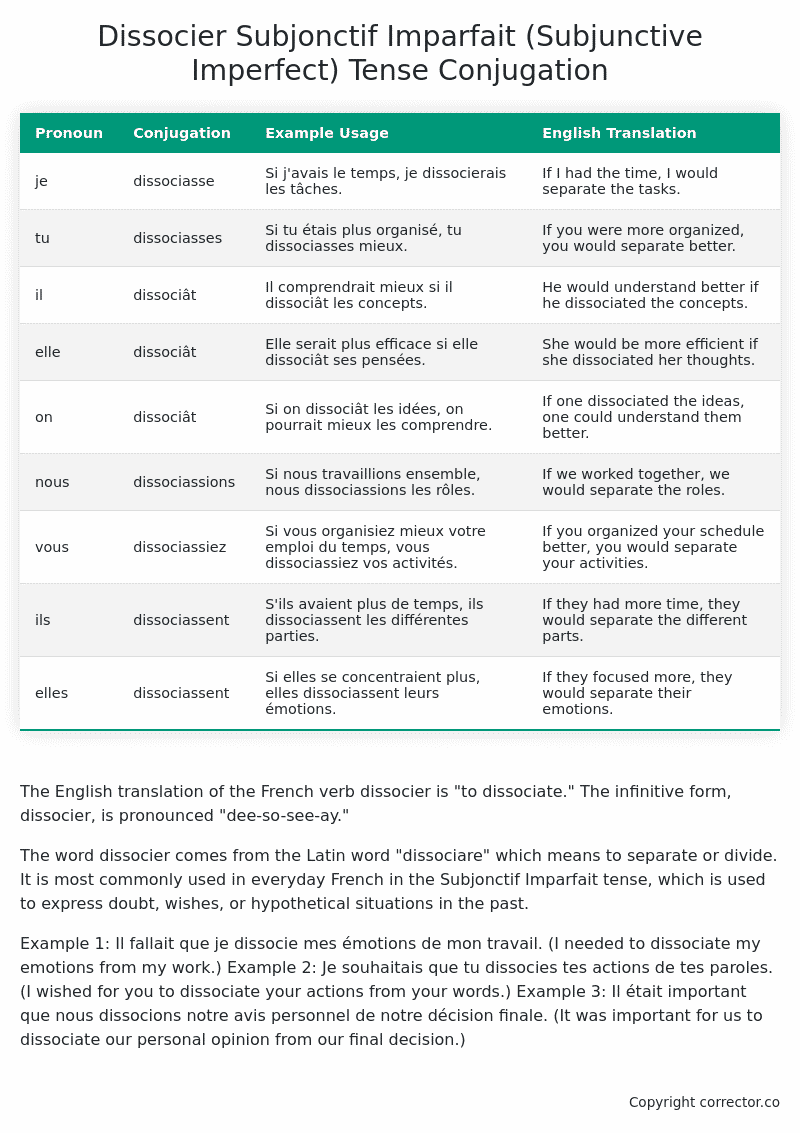Subjonctif Imparfait (Subjunctive Imperfect) Tense Conjugation of the French Verb dissocier
Introduction to the verb dissocier
The English translation of the French verb dissocier is “to dissociate.” The infinitive form, dissocier, is pronounced “dee-so-see-ay.”
The word dissocier comes from the Latin word “dissociare” which means to separate or divide. It is most commonly used in everyday French in the Subjonctif Imparfait tense, which is used to express doubt, wishes, or hypothetical situations in the past.
Example 1: Il fallait que je dissocie mes émotions de mon travail. (I needed to dissociate my emotions from my work.)
Example 2: Je souhaitais que tu dissocies tes actions de tes paroles. (I wished for you to dissociate your actions from your words.)
Example 3: Il était important que nous dissocions notre avis personnel de notre décision finale. (It was important for us to dissociate our personal opinion from our final decision.)
Table of the Subjonctif Imparfait (Subjunctive Imperfect) Tense Conjugation of dissocier
| Pronoun | Conjugation | Example Usage | English Translation |
|---|---|---|---|
| je | dissociasse | Si j’avais le temps, je dissocierais les tâches. | If I had the time, I would separate the tasks. |
| tu | dissociasses | Si tu étais plus organisé, tu dissociasses mieux. | If you were more organized, you would separate better. |
| il | dissociât | Il comprendrait mieux si il dissociât les concepts. | He would understand better if he dissociated the concepts. |
| elle | dissociât | Elle serait plus efficace si elle dissociât ses pensées. | She would be more efficient if she dissociated her thoughts. |
| on | dissociât | Si on dissociât les idées, on pourrait mieux les comprendre. | If one dissociated the ideas, one could understand them better. |
| nous | dissociassions | Si nous travaillions ensemble, nous dissociassions les rôles. | If we worked together, we would separate the roles. |
| vous | dissociassiez | Si vous organisiez mieux votre emploi du temps, vous dissociassiez vos activités. | If you organized your schedule better, you would separate your activities. |
| ils | dissociassent | S’ils avaient plus de temps, ils dissociassent les différentes parties. | If they had more time, they would separate the different parts. |
| elles | dissociassent | Si elles se concentraient plus, elles dissociassent leurs émotions. | If they focused more, they would separate their emotions. |
Other Conjugations for Dissocier.
Le Present (Present Tense) Conjugation of the French Verb dissocier
Imparfait (Imperfect) Tense Conjugation of the French Verb dissocier
Passé Simple (Simple Past) Tense Conjugation of the French Verb dissocier
Passé Composé (Present Perfect) Tense Conjugation of the French Verb dissocier
Futur Simple (Simple Future) Tense Conjugation of the French Verb dissocier
Futur Proche (Near Future) Tense Conjugation of the French Verb dissocier
Plus-que-parfait (Pluperfect) Tense Conjugation of the French Verb dissocier
Passé Antérieur (Past Anterior) Tense Conjugation of the French Verb dissocier
Futur Antérieur (Future Anterior) Tense Conjugation of the French Verb dissocier
Subjonctif Présent (Subjunctive Present) Tense Conjugation of the French Verb dissocier
Subjonctif Passé (Subjunctive Past) Tense Conjugation of the French Verb dissocier
Subjonctif Imparfait (Subjunctive Imperfect) Tense Conjugation of the French Verb dissocier (this article)
Subjonctif Plus-que-parfait (Subjunctive Pluperfect) Tense Conjugation of the French Verb dissocier
Conditionnel Présent (Conditional Present) Tense Conjugation of the French Verb dissocier
Conditionnel Passé (Conditional Past) Tense Conjugation of the French Verb dissocier
L’impératif Présent (Imperative Present) Tense Conjugation of the French Verb dissocier
L’infinitif Présent (Infinitive Present) Tense Conjugation of the French Verb dissocier
Struggling with French verbs or the language in general? Why not use our free French Grammar Checker – no registration required!
Get a FREE Download Study Sheet of this Conjugation 🔥
Simply right click the image below, click “save image” and get your free reference for the dissocier Subjonctif Imparfait tense conjugation!

Dissocier – About the French Subjonctif Imparfait (Subjunctive Imperfect) Tense
Formation
Common Everyday Usage Patterns
Interactions with Other Tenses
Subjonctif Présent
Indicatif Passé Composé
Conditional
Conditional Perfect
Summary
I hope you enjoyed this article on the verb dissocier. Still in a learning mood? Check out another TOTALLY random French verb conjugation!


